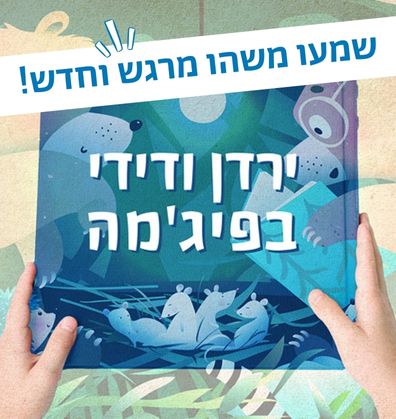מִשְׁפָּחָה וּקְהִלָּה
אחים ואחיות
ילדה אוזרת אומץ ומתמלאת בטחון בזכות קולה המרגיע של אחותה, הרפתקה סוערת ומרגשת של אח ואחות, ילד המרגיש בר מזל בהיותו אח של בעל מגבלה ועוד מגוון סיפורים על הקשר המיוחד והמשמעותי שבין אחים ואחיות, מחכים לכם כאן. שיח על הדמויות ועל הקשרים בין אחים ואחיות בסיפורים השונים, מלמד אותנו רבות על עצמנו ועל הקשרים שלנו בחיים האמיתיים.
סְּפָרִים
Book-Related Family Activities

טיפ לקריאה – בעיני הילדים
לאחר כמה קריאות אפשר להציע לילדים לספר את הסיפור בעצמם לפי האיורים. קריאה כזאת, בפרט בספרים הנוגעים בנושאים רגשיים מחיי היום-יום, מאפשרת לילדים להביע תחושות ורגשות מתוך עולמם הפנימי, ולכם – לגלות כיצד הם חוו את הסיפור – מה הם בחרו להדגיש? אילו פרטים הם הוסיפו?

From the Story to Us
You can look at the illustrations together, notice the children’s actions and facial expressions, and ask: How do they feel? When are they having fun? Are they angry? In your opinion, why does the girl want to be “more”? How do you feel when someone tells you “I’m more”?

Looking for More
Enrich your vocabulary with various adjectives while playing an amusing and challenging game around the house: Pick an item you have at home. Ask – “which is bigger/smaller/more transparent/more colorful…” and so on, depending on the description of your choice. The other player will now look for an identical item that is “more”, such as a larger ball or softer pillow.

Family reading advice
This is a special book about a special family, in which one brother is visually impaired or blind. The narrating brother is well aware of the challenges in his family and the restrictions required of him at home, yet chooses to see the world in a positive light. We suggest that you, parents, read the book before reading it together to adapt the reading and discussion to this book’s unique contents.
Discussion
Do you think the child in this story is lucky? Why? What makes you lucky? You can share with one another, parents and children, the good things in your shared life as a family. You can create a regular ritual during which, once a week, family members share the positive things that they experienced that past week.
What can you see…?
How do blind children experience life? Scan the code to watch an episode of “I’m sorry for asking” about blind children. Following the video, you can discuss what makes our lives similar to or different from that of the children depicted in the video.

What do we discover when we reread?
Rereading can reveal new and surprising things. We recommend reading the book twice, looking at the illustrations and searching for clues about Hagay’s visual disability: What about the words and illustrations hints at this family’s challenge? Did you notice it the first time you read the book?

Make believe
Hagay knows how to tell made-up stories. You can try it too! How about choosing two items and using them to tell a made-up story: a brush and a rug, a bottle and a stuffed cat, a hat and a window – what can happen to them in the made-up story you will come up with together?

More arts & crafts and activities can be found on the Sifriyat Pijama Pinterest page.
Family reading advice
Simachi’s Big Day is a long book. We therefore recommend reading it in two parts, pausing at the point where Simachi wonders why her brother, Avram, is dressed in his best clothes, and reading the rest the next day.
Memories
In this book, Grandma is recalling her childhood memories. This is your chance, as parents, to share special moments from your own childhoods too. Talk about the things you did, those you never thought you would do, or the relationship between you and your siblings. Ask your children: Can they recall special things they did and, looking back, surprised them because they made them discover their own abilities?
Listening to Simachi
What does the story sound like? Scan the code and listen to the story while looking through the book.
A pineapple on my head
Avram and Nemi play a game by walking with a pineapple on their head and seeing who lasts longer without dropping it. You can also play a similar game: choose an item that you can put on your head – a pillow, toy or box, and find out: Which of you can walk while keeping it on your head? And how far?
Following the sea
The book describes many seaside activities: the fish moving, rowing, swimming, bringing fishnets in, sailing or flying a flag on the boat’s flagpole. You can choose one of these activities, and mime it. Your family will need to guess which activity you meant, and look for it among the book’s illustrations. Good luck!
A discussion on fear and encouragement
As our children grow up, they experience various fears, but discussing them helps them to cope with them, while instilling in them a sense of security. Together you can choose to discuss what they find scary, and what helps them overcome their fears.
Listening to a story
Would you like to hear Maayan and listen to everyone cheering her on? Scan the code and listen to the story together.
הַסִּפּוּר לְהַאֲזָנָה – עַכְשָׁו בָּפּוֹדְקַאסְט שֶׁל סִפְרִיַּת פִּיגָ’מָה!
בגן At the playground
After reading this book, you may enjoy going to the playground together, and trying out the equipment together as well as separately. Perhaps you would like to invent a special course from the slide to the swing and so on that would bring joy to all of you.
Family encouragement
“Hooray, Maayan!” Everyone calls out when Maayan is scared. How do you cheer one another on? Perhaps you could come up with family words of encouragement, find a motivating song, or a chant you all agree on that cheers you up and gives you strength.
Suggested Family Activities
- You can flip through the illustrations with your children and identify the work that the brothers do together. In every home there are tasks that invite collaboration. Which household chores are easier and more pleasant to carry out together?
- There are many verbs that describe the work of the farmer. Do your children know them? You can act out the different actions using pantomime.
- Each of the brothers considers the other’s needs and gives up his share without being asked. Together with your children, you can make an illustrated list of examples where members of your family share and are considerate to one another.
- Like the brothers in the story, you too can prepare a surprise for your children in the middle of the night. Following your example, your children may surprise you too!
- The brothers in the story understand that fair does not always mean equal. How true this is in family life as well! You can demonstrate this principle using clothes: Gather up different pieces of clothing belonging to the members of the family and ask your children to sort them. Would it be fair to give Mommy’s blouse to a child, or Daddy’s slacks to a baby? This can lead into a discussion of the needs of members of your family, and to your assurance that their needs are met, even if they don’t always get exactly the same thing as their siblings.
- “Everyone has a city named Jerusalem” (Natan Yonatan): After reading together the tale of the Temple, you can show your children pictures of Jerusalem (or visit!), sing songs about Jerusalem, and relay to your children stories about “your Jerusalem”.
Proposed Family Activities
- Each member of Ury’s family suggests another humor-filled interpretation of his utterings, all of which have been illustrated by Ora Ayal. You may enjoy looking at the illustrations together, and suggesting that your child draw their own interpretation of what Ury said.
- Jonathan hears half a word and understands what Ury meant. You too can be “interpreters”: pick an object in the room and say the first half of its name. The “interpreter” must then guess what you were referring to. Once they’ve guessed, you can switch roles.
- Jonathan is five years old, “which is exactly in between being small and being big”. This may be a good opportunity to ask your child when they enjoy being small, and when they prefer being big.
- Isn’t it fun to speak a language only you can understand? You could invent your own vocabulary and write it in your own private dictionary. How would you say “it’s dinnertime”? Or “good morning”? or “I’d like a kiss”?
- Brothers can help one another at any age. You may want to share a childhood experience with your child in which you experienced or did something with a sibling. Grandparents are also welcome to share sibling stories.
- Many remember their children’s delightful mispronunciations when they first learned to speak. Do you? Your children will surely love to hear them. You can write them down here for them to remember:
- After you have read the story, you may want to visit a nearby art museum or gallery with your child. You could also go online and look at images from art exhibitions across the globe.
- Bezalel Art School is well-known in Israel today, but few know the name Boris Schatz. Many people have done great things but are not remembered for them. Try to think of a person in history that you have heard of or know about, whose story you would like to share with your child. You could create a short book about this person and send it to us. Enjoy reading and discussing the story together!

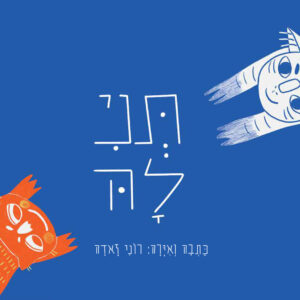 Let-Her
Let-Her 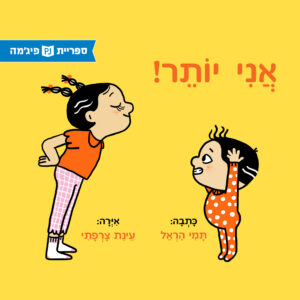 I’m More
I’m More 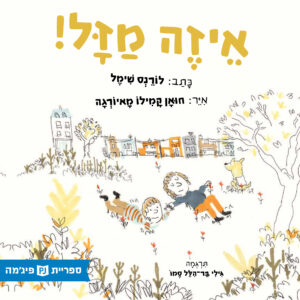 How Lucky I Am
How Lucky I Am 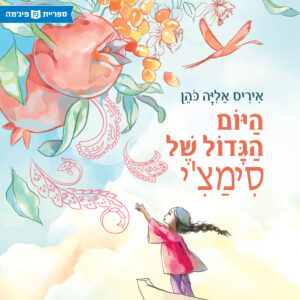 Simachi’s Big Day
Simachi’s Big Day 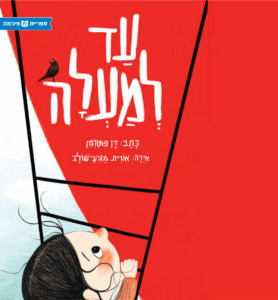 Up and Over
Up and Over 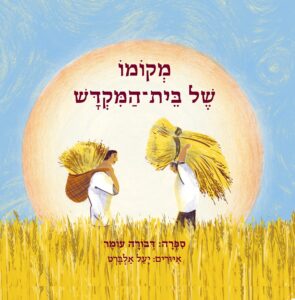 The Site of the Temple
The Site of the Temple 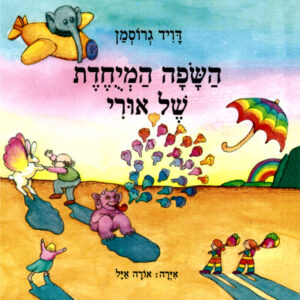 Ury’s Special Language
Ury’s Special Language 


